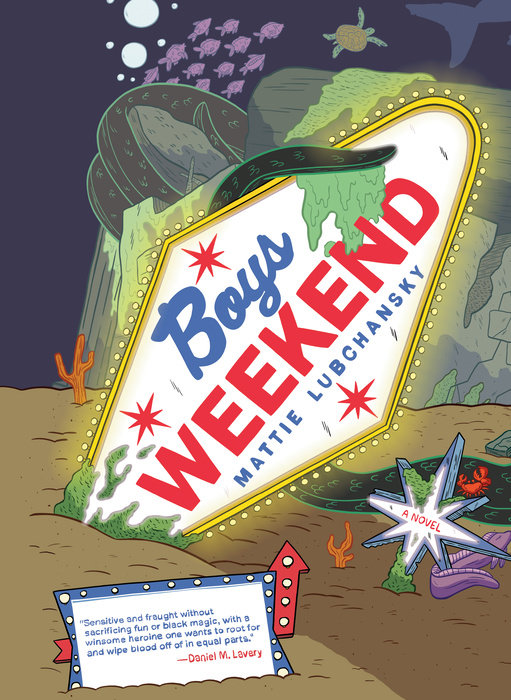Apocalyptic Friendships and Other Ends of the World: On “Boys Weekend”
Mattie Lubchansky's "Boys Weekend" adds science fiction and horror to the comedy of manners.

Does science fiction, as a genre, play well with others? The comics medium is more open than most to smashing together genre tropes and plot devices. I’m not just talking about superhero shared universes, where a tech genius and a magician might team up against extraterrestrial beings; the long-running series Saga is explicitly a work of science fantasy, and there have been some other interesting forays into genre collisions over the years as well.
Into this not-quite-a-tradition steps Mattie Lubchansky’s graphic novel Boys Weekend. Prior to reading this, most of my experience with Lubchansky’s comics work came via their contributions to The Nib, which regularly blended memorable storytelling with sharply comic observations on all things political. There’s plenty of both in Boys Weekend, but its use of a broader canvas shows precisely what Lubchansky is capable of.

Also, you won’t have to dig too hard to find elements of both science fiction and fantasy here, the latter laced with a bit of cosmic horror. This is the story of Sammie, who travels to the artificial island of El Campo for their friend Adam’s bachelor party. Boys Weekend is set a few years into the future, and tourist locations born out of seasteading are only one of the science fictional touches featured here.
Fundamentally, though, both the science fiction and horror elements are there to boost the awkward interpersonal dynamics here. Sammie is transfeminine, and the first point at which alarm bells will likely go off for the reader is when they meet their fellow guests at the bachelor party — most of whom are oblivious to their gender and pronouns, and some of whom actively bristle at speaking about them accurately. If you took a shot every time someone misgenders Sammie, you would likely black out before getting to the halfway point of this book.
The Elliott Smith lyric about “The people you’ve been before/ That you don’t want around anymore” rings very true here. Sammie being trans is far from the only way in which they’ve parted company from their old friends; they also work as an artist’s assistant, a far cry from the tech-bro mentality of many of the other guests. To the extent that there are moments of bonding, they’re generally about who these people were years ago, not who they are now.
There’s plenty of drama and comedy to be mined from the anxiety that comes from reuniting with people long after your lives went down very different paths. But that isn’t all that Lubchansky is after here: Boys Weekend is set in the near future, and the partygoers' destination is a libertarian seasteading paradise where, as a different song put it, anything goes. There’s also the presence there of a group of people in innocuous vests, the Grey Hand, who appear to be part of an organization that’s either a pyramid scheme or a cult, or possibly both.
As Sammie says before leaving for El Campo, “I’m still stuck in male friendship mode with him and all those guys! ‘Talking’ is reserved for when we’re really drunk or high, or about to be murdered or something.” If you’re reading this and detecting a bit of foreshadowing, you are absolutely correct. While the comedy of manners is a big part of Boys Weekend, it’s far from the only one at play — and the dangers Sammie faces on El Campo go far beyond painful conversations and the end of a fading friendship.
It isn’t hard to imagine a version of this story set in the present day, with no uncanny elements. A less stylized version of this story would have still hit a lot of the same emotional beats, but the use of the fantastical and the science fictional helps heighten the stakes in ways that resonate with the overall themes. This reaches its peak late in the graphic novel, when one of the bachelor party activities taps into Sammie’s anxieties and their need for catharsis.
Lubchansky’s skills as a cartoonist also come into play here, from their skills at different characters’ facial expressions to the background gags in El Campo that illustrate just how ludicrous it is there. They include a building designated as the “El Campo Institute for Canceled Art” and a poster urging diners to “Eat the pepper that kills you!”
Boys Weekend is both very funny and abounding with high concepts, but it also rewards repeat visits, as certain aspects of the cult subplot come into clearer focus on a second read. Certain lines hit with more impact on a second read as well, as when Sammie gets candid towards the end of the book.
“If a world doesn’t hold anything for you? You can leave it behind. We can expect better for ourselves,” they say. That’s good advice, whether or not you’re facing down an eldritch cult that could destroy the world.